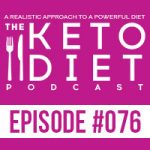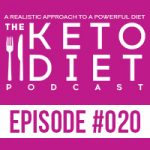I want...
Hormone Support for Women on Keto
March 16, 2019 By
Leanne Vogel

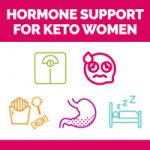 March 8, 2019
March 8, 2019
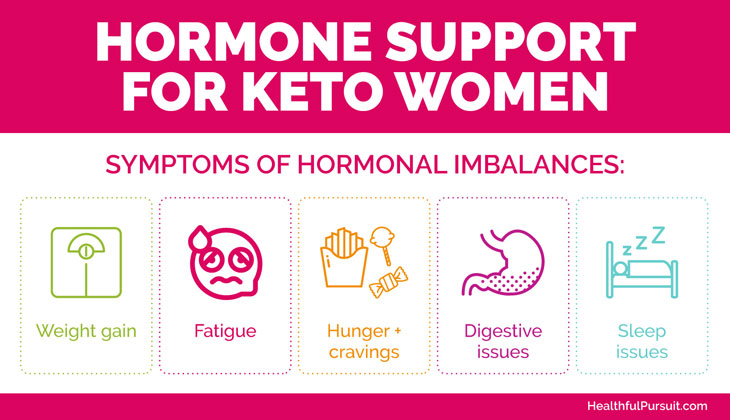
We rely on hormones as little messengers that carry signals for various functions within the body. Keto can help to balance your hormones so that your body can better understand when to store body fat, or when to trigger a stress response after an injury to help with healing. Keeping your hormones balanced is essential for overall wellness, but where should you start?
Signs of Hormonal Imbalance | Common Issues | Estrogen Dominance | Insulin Resistance | Hormones and Hunger | Adrenal Fatigue | Thyroid Disorders | Balance on the Keto Diet
Hormones do plenty of useful things, 1 but if they’re out of whack, you’re not going to feel your best. There are a multitude of ways hormones can go wonky, from estrogen dominance to insulin resistance, adrenal dysfunction, and beyond, and getting to the root cause of your hormonal imbalance can be tricky.
I’m often asked if keto contributes to hormonal imbalance, and they want to know how keto can help address their specific hormonal issues. Rest assured, a well-formulated, nutrient-rich keto diet will, in fact, support your body and help you overcome just about any hormonal imbalance. The key is adjusting your keto approach to make it work for your unique body.
This guide will help you understand how keto promotes hormone balance, give you resources to individualize your keto plan, and help you develop a better understanding of how to get the hormone support you need while maintaining your keto diet.
Can you manage your hormones while you’re on a keto diet? Of course! This guide will help you develop a better understanding of how to get the hormone support you need while maintaining your keto diet.
Common Signs of Hormonal Imbalance
Do you think that you may have hormonal issues? Are you struggling to identify signs of hormonal imbalance? Sometimes, it’s hard to recognize the signs of hormonal imbalance — check out these key symptoms that could point to hormonal issues:
- Weight loss plateaus or excess weight gain
- Struggles with irritability or significant mood swings
- Inconsistent hunger from ravenous to never hungry
- Feeling tired all the time
- Depression or anxiety
- Cravings for specific types of food over and over
- Hair loss
- Hot flashes
- Breast tenderness outside of a couple of days before your period
- Feeling cold even when others around you insist that the room is perfectly warm
- Dry skin or brittle nails
- Issues with sleep: trouble falling asleep, waking in the middle of the night and not being able to return to sleep, or chronic insomnia
- Acne
- Digestive issues: constipation, diarrhea, ongoing upset stomach, or nausea
- Blood sugar irregularities
All of these symptoms can be linked to a range of hormonal conditions.
Common Issues
When I talk about hormonal imbalances, people typically think of sex hormones, especially with regards to women’s health issues. They’re imagining PCOS, 2 PMS, PMDD, amenorrhea, infertility, 3 irregular cycles, and menopause: the most common issues that women deal with when their hormones out of whack. Sex hormone irregularities, however, are only one genre of hormonal imbalance, and they cover a wide range of issues that can stem from both high and low sex hormones.
Imbalanced hormones are often at the root of so many different issues. Sadly, many of those conditions go untreated for a wide range of reasons:
- Doctors don’t want to test hormone levels
- “Normal” ranges are far too broad, and doctors are often reluctant to diagnose a hormonal imbalance even in women who are close to the high or low for that so-called norm
- Doctors are reluctant to consider the possibility that the mystery symptom you’ve been struggling with could be related to a hormonal imbalance
In a conventional medical setting, hormonal birth control is often used as a band-aid to cover up the symptoms of issues caused by hormonal imbalances. Instead of treating the root cause, doctors offer birth control as a fix-all, and unfortunately, that often doesn’t offer the solution that women need. Hormonal birth control may, in fact, cover up the symptoms of an underlying problem, and can prolong the suffering or lead to hormonal problems for women suffering from these symptoms. My Happy Keto Body Program gives you tools to get to the root of your hormonal issues so you can find a balanced solution.
Estrogen Dominance Explained
I want to take a more in-depth look at estrogen dominance, in particular, because it’s a sex hormone irregularity that I see all too frequently in women who are struggling with hormonal imbalance. In fact, it’s the most common hormonal imbalance I see in women who join my Happy Keto Body Program! Symptoms may include cycle irregularities, 4 bad PMS, weight gain or metabolic issues, 5 mood swings, and irritability.
Estrogen dominance occurs when your estrogen levels are higher than your progesterone levels. Estrogen levels don’t have to be super high, in fact, estrogen levels may still be within those normal ranges. Simply put, if estrogen is higher than progesterone, that qualifies as estrogen dominance. Many women may have low hormones overall, but struggle with estrogen levels that are ever so slightly higher than their progesterone levels.
A number of factors may contribute to estrogen dominance, including:
- Hormonal birth control
- Exposure to endocrine disruptors in the environment (including plastics, beauty products, home cleaning products, etc.)
- The Standard American Diet (refined carbohydrates, alcohol, lack of fiber)
- Physical and mental stress
- A sedentary lifestyle
All of these factors can put a strain on the liver, which is responsible for eliminating excess estrogen and promoting detoxification within the body. If your liver is under stress, it will have a harder time carrying out the tasks necessary to keep your hormones balanced and ensure that your body functions at peak efficiency.
How Insulin Resistance Impacts Your Body
Insulin is a hormone that is responsible for helping with blood sugar regulation. In an insulin sensitive body — that is, one that is not insulin resistant — your body has a natural response to carbohydrate consumption. When you eat a food that contains carbohydrates, those carbohydrates are quickly broken down into glucose, which elevates your blood sugar. Your body then produces insulin to help get the glucose into your cells where it can be turned into energy and utilized for all your bodily functions.
In an insulin-resistant body, it doesn’t work that way.
Insulin resistance is usually caused by continuously elevated blood sugar. This is most common when refined carbohydrates are consumed in excess. The body responds by cranking out insulin at high levels. When this happens repeatedly over time, your body becomes insensitive, or even unresponsive to insulin, making it harder for glucose to enter your cells.
People with insulin resistance often experience a wide range of problems. They may:
- Experience ongoing fatigue
- Struggle with weight gain
- Have a higher risk for diabetes, hard disease, and metabolic syndrome
Your Hormones and Your Hunger
Do you struggle with ongoing feelings of hunger? Is it hard for you to convince yourself that you’re full, even when you’ve eaten a full meal? Conversely, do you struggle to remind yourself to eat at all? Hormones are directly responsible for regulating hunger and fullness. 6 If you’re struggling with ravenous hunger (feeling like a bottomless pit) or lack of hunger, especially on a reasonably regulated diet, your hormones may be to blame.
Ghrelin is a hormone that communicates hunger and stimulates appetite. Higher ghrelin levels = stronger feeling of hunger, and you may struggle to recognize the difference between hormonally-influenced hunger and genuine hunger.
Leptin helps signal fullness by sending a message to your brain to let it know that it’s time to stop eating. The hormone itself is produced by fat cells in your body and plays a big role in calorie intake, calorie burning, and the amount of fat you store. When you become resistant to leptin, your brain no longer receives the fullness signal. Leptin resistance can be caused by:
- Poor sleep patterns
- A body that is in starvation mode due to too-low calorie consumption
- A diet high in processed foods
- Excessive calorie restriction
- Overeating
- Stress
Leptin resistance is a big reason that people with obesity struggle to lose weight; 7 while they may have plenty of leptin, their brain isn’t getting the signal, so they never feel satiated.
Understanding Adrenal Fatigue
Adrenal glands produce a bunch of important hormones responsible for various functions within the body, 8 from cortisol (stress and metabolism) to estrogen, progesterone, testosterone, adrenaline, and more! When your adrenals aren’t working optimally, either because they are putting out too much cortisol or too little, you have adrenal fatigue. This can result in:
- Feeling “wired but tired” — you can’t slow down, but you’re exhausted at the same time. Or, your brain is on high, but you feel exhausted and don’t have the energy to complete all the tasks on your plate
- Taking longer to recover than usual after your workouts. It may take hours for you to feel like yourself after a workout, or you may need additional days to recover from something that should be routine
- Weak muscles, especially in the legs
- Cravings for sugar and salt
- Increased energy after 9 pm, when you should start to feel yourself slowing down
- Feeling short-fused and snappish, as though you’re constantly on the verge of getting angry
- Low blood pressure
- Becoming irritable or overwhelmed easily
Adrenal dysfunction may be caused by any kind of excessive stress. 9 This may include a lack of nutrients brought on by a diet that is too low in calories, an imbalanced thyroid, long-term lack of carbohydrates, and excessive workouts as well as more traditional forms of stress, including emotional and psychological issues.
Want to learn more? These are thesigns of adrenal dysfunction.
Thyroid Disorders and the Challenges They Present
There are several different types of thyroid disorders, many of which are already familiar to many women. These include hyperthyroidism, hypothyroidism, Graves’ disease, and Hashimoto’s. Most often, in the Healthful Pursuit community, I see women struggling with hypothyroidism and its impact on the body; however, all of these disorders can cause substantial problems for the women who live with them.
Hypothyroidism usually contributes to symptoms 10 such as:
- Hair loss
- Low energy
- Weight gain or difficulty losing weight
- Constipation
- Dry skin
- Headaches
- Heavy or absent menstrual periods
- Lethargy
Often, it’s very challenging to get the right thyroid diagnosis, and even more challenging to find the right treatment plan to maintain the delicate balance of the thyroid.
Many women find that symptoms of hypothyroidism develop shortly after beginning their keto journey. In my practice, I’ve found that eating low-carb for too long can cause these common issues for women. Most of the time, however, if these symptoms crop up early in your journey, it’s not because of the keto diet. Rather, the imbalance was probably already there, and regular low-carb eating simply brought everything rushing to the surface.
As a result, you may find yourself struggling to balance your thyroid issues with your desire to stay on the keto diet. On the other hand, if you’ve been eating extremely low-carb for six months or more before symptoms started to really become noticeable, the change in eating style may have spurred the imbalance. Learn how to manage your thyroid imbalance on keto.
Balance on the Keto Diet: Finding a Solution for Hormonal Imbalances
You want the weight loss and overall health benefits of the keto diet, not to mention figuring out a way to fix up those hormonal imbalances. Can you have it all? The answer is yes! Consider some of these important solutions to create a better diet for yourself.
Listen to your body. Often, your body will tell you exactly what it needs and wants, if you’ll just take the time to listen. With today’s busy lifestyles, however, many women get caught up in other things and forget to check in with their bodies. Don’t fall into this trap! Try some of these strategies:
- Check out journaling, which will help you uncover some of your inner motivations. It’s okay if you can only manage a few words per day!
- Engage in regular meditation. You’ll be surprised by the difference it makes.
- Track how your body responds to different changes in your diet, activity level, or sleep. Often, you already know what you need, you just haven’t yet taken the time to sort it out.
Want to take the guesswork out of the dieting process? Check out The Keto Diet Podcast Ep. #066: Taking the Guesswork Out of Dieting. This episode will help you better understand what your body needs and how to adapt your diet.
Chances are, your body already knows what’s best for you. It has your back! You just have to be willing to listen and experiment.
Try out the keto diet. Keto is an amazing way to balance your hormones and get back to feeling like yourself. Especially if you make an effort to incorporate superfoods into your keto diet, which can help balance your hormones. You may find that on the keto diet, you have more energy, sleep better, and better understand the hunger and fullness cues your body is giving you. Check out The Keto Superfoods You Should Be Eating to learn more.
Here are some examples of keto superfoods that can make a huge difference in your diet:
- Cruciferous veggies 11
- Leafy greens
- Nuts
- Seeds
- Berries
- High-quality meat
- Fermented foods
- Wild caught salmon 12
- Healthy fats
- Adaptogens 13
- Herbs
- Spices
It doesn’t matter if you have high estrogen, low estrogen, low progesterone, PCOS, 14 insulin resistance, 15 leptin resistance, 16 fatigue, 17 insomnia, 18 mood swings, 19 difficulty losing weight, 20 or a combination of all of the above; eating Fat Fueled will likely have a HUGE impact on your recovery. I’ve received thousands of emails and letters from women who have experienced positive hormonal changes while following my keto programs. Being Fat Fueled allows you to heal your body and encourages balance — and that simple change in your life can lead to big changes in your body.
Is the keto diet right for you? There are several common signs to watch out for, as outlined in this video: Is Eating High-Fat, Keto Right For You? 10 Signs To Watch Out For. Take a look to discover the transformative difference keto can make in your life!
Add carb ups into your diet. Carb ups in the evening support the thyroid, help with sleep, 21 and so much more. I put together a resource All About Keto Carb Ups and Cyclical Ketosis to help you better understand carb ups and how they might impact your diet.
Avoid fasting. If your hormones are already imbalanced, fasting may put too much stress on your body. Some women choose to use intermittent fasting in combination with keto to help lose weight faster. Unfortunately, this strategy may also put more strain on your body, which can lead to weight loss struggles. If your hormones are out of whack, consider taking a break from fasting and revisiting it when your body is in a more balanced state. Not sure whether or not fasting is right for you? Afraid it isn’t working? Check out this minisode to learn more: #M26 Signs Fasting Isn’t Right for You.
Add in some key lifestyle changes. Changing your life isn’t just about changing your diet. Other lifestyle changes can also help balance your hormones and make you happier and healthier. Try some of these important strategies:
- Add in walks or another form of movement that you genuinely enjoy. Find a type of exercise that you look forward to! You shouldn’t feel as though you’re constantly forcing yourself to exercise. Instead, try out different kinds of exercise until you find something that works for you. Yoga, classes at the gym, videos at home, or even just going for a walk at the park can all have a big impact on your health.
- Look into therapy if needed. Sitting down and talking out your problems can help make you mentally healthier, which may in turn better balance your hormones.
- Learn to manage stress. Look for ways to better balance the stress in your life. Consider removing ongoing forms of stress or looking for ways to get help, whether that means finding someone else to look after the kids occasionally or taking an ongoing task off of your plate and giving it to someone else. Are those ongoing sources of stress really benefiting your life? If not, consider how you can work around those challenges with these tips for stress management.
- Engage in better sleep hygiene. Essential oils, a better pillow or bed, or simply going to bed at the right time every night can all make a big difference in how your body copes with stress. The right amount of sleep can also help balance your hormone levels.
Of course, the keto diet can also help make you reduce stress in general, so check out this key dietary change and see how it can impact your life. One small change may create a cascade that helps transform your hormones and your body.
Try out Happy Keto Body. Happy Keto Body is my doctor-approved 12-week journey to a customized keto lifestyle for women. It’s designed to eliminate frustrations, overcome hormonal issues, get fat adapted and stay fat fueled for life — a great way to get started on your keto journey or to supplement your existing materials. Whether you’ve never done keto before or you’ve tried it before and become frustrated, Happy Keto Body can help! It includes videos, coaching calls, and an exclusive online community of keto sisters supporting you every step of the way: the perfect combination for keto success.
Chat with your doctor if you need to. Some conditions, no matter how much you might like them to, can’t be solved by diet and exercise alone. If you’re struggling with ongoing hormonal issues, sit down for a chat with your doctor. Talk with them about whether or not you need to consider running blood tests to get to the root of your issues. Once you’ve identified exactly what your hormonal imbalance is, you’ll be in a better position to fix it!
On the keto diet, you automatically get a ton of hormone support. Superfoods, a better way of eating, and a fat fueled way of life combine to help you get healthier and have a better idea of what your body really needs. It’s time to get started — and I’m here to help you every step of the way.
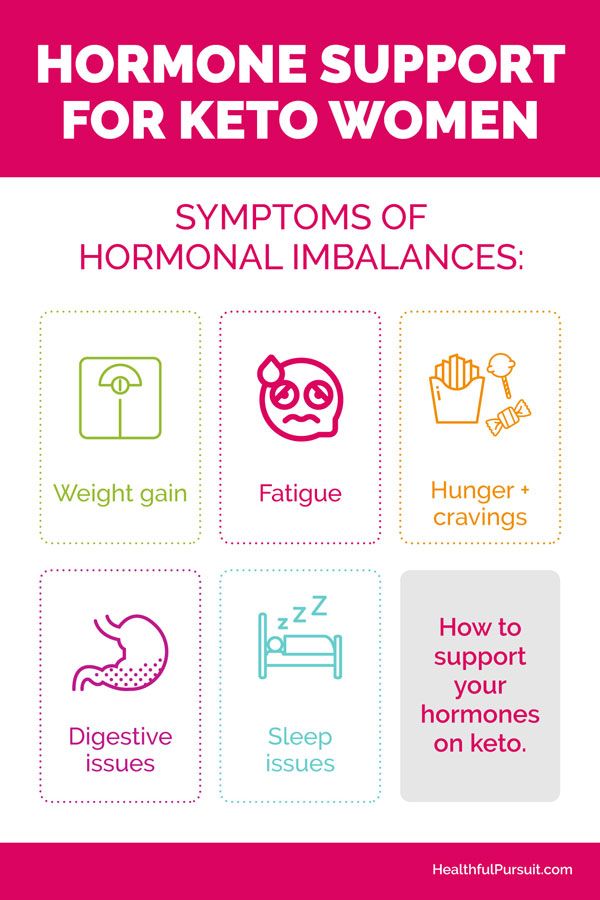
This entry was tagged: carb up, dairy-free keto, eating high-fat, eating keto, eating low-carb, fat-adapted, health, high fat, holistic nutrition, how eat keto, keto, keto basics, keto diet, keto for women, keto life, ketogenic, ketogenic diet, ketogenic for women, ketosis, low-carb, low-carb paleo, what is keto
Hi! I'm Leanne (RHN FBCS)
a Functional Medicine Practitioner, host of the Healthful Pursuit Podcast, and best-selling author of The Keto Diet & Keto for Women. I want to live in a world where every woman has access to knowledge to better her health.

